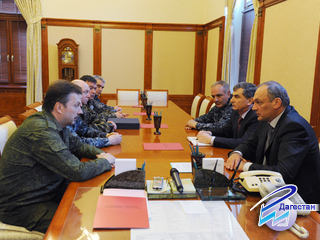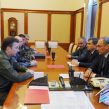
Dagestan’s President Promises a Decisive Crackdown on the Insurgency
Publication: Eurasia Daily Monitor Volume: 9 Issue: 70
By:

On April 6, the president of Dagestan, Magomedsalam Magomedov, met with Russian Deputy Interior Minister Sergei Gerasimov in Makhachkala. The chief police official of the North Caucasus Federal District, Sergei Chenchik, and the chief of the Russian Interior Ministry’s police aviation and special units, Vladimir Gorshukov, accompanied Gerasimov. The delegation visited Dagestan to inspect the troops after their surprise redeployment from Chechnya to Dagestan and the creation of an Interior Ministry temporary operational group in Dagestan in March, similar to the temporary operational group set up in Chechnya at the start of the second Russian-Chechen war (https://www.riadagestan.ru/news/2012/4/6/134628/, April 6).
The mass relocation of the Interior Ministry’s troops from Chechnya to Dagestan did not go unnoticed, as numerous eyewitness bloggers wrote about it, while local analysts predicted more violence ahead.
At the meeting on April 6, Magomedov once again denied information about tens of thousands troops being redeployed into the republic. Only temporary police units would be stationed across Dagestan to assist the local police, Magomedov said. For a republic with three million people there are too few policemen, top Dagestani officials stated. They welcomed at least a temporary boost in the size of the police forces (https://www.riadagestan.ru/news/2012/4/6/134628/, April 6).
Earlier, on March 29, Dagestan’s Interior Minister Abdurashid Magomedov complained that Dagestan had only about 18,000 policemen, the same number as in the Siberian region of Krasnoyarsk, while the republic had far more security issues than the Siberian region. In February, security forces bases were established in five districts of Dagestan – Derbent, Kizlyar, Sergokala, Untsukul and Tsumada. The bases were manned with Interior Ministry troops and special forces from the Federal Security Service (FSB) and police (https://www.kavkaz-uzel.ru/articles/204412/, April 7).
The independent Dagestani newspaper Chernovik pointed out that in the near future the territories of three districts of the republic, Karabudakhkent, Buinaksk and Sergokala, are likely to become “an arena of actions by the law enforcement agencies against the terrorist groups.” According to the paper, the way law enforcement personnel are being deployed in Dagestan provides a glimpse into how the government plans to crack down on the insurgency in the republic. According to eyewitness reports by local village residents, the troops ready their bases as if preparing for a full-scale, conventional war. A buffer zone is being established between the mountainous districts and the lowlands, while detachments of security services personnel and Interior Ministry troops are concentrated in the most insurgency-ridden localities, the paper concluded (https://chernovik.net/news/486/News/2012/04/07/13346, April 6).
The surge of government forces in Dagestan illuminates the astonishing similarities between the current Russian government’s strategy in the Caucasus and the Russian Empire’s strategy in the region in the 19th century. Across the North Caucasus, the Russian imperial forces regularly blocked the mountainous areas and tried to relocate the locals from the mountains to the plains where they could be more easily controlled. Among the contemporary North Caucasian republics, Dagestan has an unusually high population density in the mountains, partly due to high fertility rates among the republican population and the mild climate in its mountains.
Following the arrival of reinforcements in Dagestan, fighting in the targeted areas intensified. On April 2-3, in two separate incidents in Dagestan’s Sergokala district, six insurgents and one Interior Ministry soldier were killed (https://www.kavkaz-uzel.ru/articles/204241/, April 4). The Sergokala jamaat is headed by a Turkish citizen, Mukhanned (aka Abdusalam). Reportedly, during a recent government meeting in Karabudakhkent, the chief of the Dagestani branch of the FSB, Andrei Konin, reprimanded Sergokala residents for allowing a Turkish citizen to have a commanding position in the district (https://chernovik.net/news/486/News/2012/04/07/13346, April 6). One should bear in mind that Turkey is home to a majority of the North Caucasian exiles whose ancestors were deported by the Russian Empire to the region in the 19th century. Turkish or Middle Eastern rebels in the North Caucasus often have North Caucasian origins.
However, violence in Dagestan is not restricted only to the recently targeted zones in the Dagestani mountains. On the plains, in Khasavyurt district on April 6, unidentified attackers gunned down a police officer. A civilian who was in the car with the officer was wounded and subsequently died in the hospital (https://www.kavkaz-uzel.ru/articles/204423/, April 7). On April 8, a suspect rebel was killed in the city of Khasavyurt when he resisted the police’s attempt to establish his identity. According to police, the slain man, 27-year-old Said Goitiev, had joined the rebel forces a year earlier, while his relatives asserted he had disappeared (https://dagestan.kavkaz-uzel.ru/articles/204478/, April 8).
At the meeting with the Russian Interior Ministry delegation on April 6, Dagestan’s President Magomedsalam Magomedov stated: “The series of recent successful operations that targeted the leaders of the bandit underground produced good feedback from the people. [This is] because everybody is fed up with this threat [the insurgency]. We want to get rid of, to clean our land of, all kinds of extremists, terrorists, radicals as soon as possible” (https://www.riadagestan.ru/news/2012/4/6/134628/, April 6). The troop reinforcements pouring into Dagestan probably accounted for the vociferous tone of the Dagestani leader. However, as reinforcements come from the outside, internal opposition to the Russian outsiders might grow in the republic. While the Dagestanis will not necessarily stage a mass revolt against the central government in Moscow, the quiet growth of opposition to Russian rule in the republic is becoming more likely than ever.




